Truong Phi: The real human mystery makes posterity clear
Truong Phi's bravery has been recorded in many historical books. But his appearance has always remained a mystery.
The Romance of the Three Kingdoms (also often referred to as the "Three Kingdoms") is one of the four great novels of China. Not only was it an outstanding success in the field of literature and art, but its later influence on the culture of East Asian countries was also extremely far-reaching.
One of the greatest achievements is that author La Quan Trung has prominently portrayed the characters with typical personality traits: A multi-skillful Zhuge Liang, an outsider Liu Bei. from charity but deep inside, a very complicated and loyal Guan Yu, but also full of arrogance.
In history, Truong Phi was a compatriot of Luu Be, always had an extremely close relationship with Liu Bei's father and son. Truong Bao, Truong Phi's eldest son, died early. The second son is Truong Thieu, working as an official to the post of Thi Trung. Later, Truong Thieu followed the late master Luu Thien to surrender to Wei, and was ordained as Lieh Hou. Truong Phi's two daughters were both married to Luu Thien, the son of Liu Bei.
Interestingly, posterity is always interested in whether, besides the pompous or malicious image that the author tries to build in the novel, the real-life character archetype is the same or not, and even if there is a difference, is still accepted.
Despite many contributions to the cause of the Shu Han dynasty, being a famous hero of the Three Kingdoms and being praised by people, in everyday life, Truong Phi is always considered a typical example of personality. hot-tempered, hasty, rude (that's why new people call it "hot like Truong Phi"). This impression is clearly created from the overwhelming influence of the novel Romance of the Three Kingdoms.
When archaeologists discovered and excavated the tomb identified as Zhang Fei in Sichuan province (China), the relics found in the tomb surprised them.
Firstly, the relics in the grave show Truong Phi's amazing calligraphy and academic talents
Specifically, experts have discovered many calligraphy works here. In previous historical studies, there were some relics that were copies of Truong Phi's writing, but compared to the original works in the tomb, these relics naturally did not reflect the nature of the handwriting.
In the tomb there is also a stele carved by Truong Phi himself, it can be seen that Truong Phi's handwriting is very unique, strong and decisive, but the soul exuded from the handwriting is hard to match. Even experts estimate that very few people of the Three Kingdoms period have a calligraphic skill comparable to that of Zhang Fei!
From this analysis, it can be seen that the real-life archetype Truong Phi is not a crude man, his calligraphy skills may reflect his exceptional talent for academics. In ancient society, anyone who could write beautifully had a high level of culture, because anyone who practiced calligraphy knew the difficulty of ancient calligraphy.
Truong Phi's face
Truong Phi's bravery has been recorded in many historical books. But his appearance has always remained a mystery.
In the book "Three Kingdoms" by Tran Tho recorded that: Luu Be "big ears drooping over his shoulders, hands above his knees", saying that Quan Vu is "beautiful palace" (The beautiful bearded man). But Truong Phi's appearance has never been recorded. The image of Truong Phi in novels and comedies "mighty black face" may only be the imagination of artists.
According to the Beijing scientific and technical report in 2004, at Zhang Fei's mountain compound in Jianyang, Sichuan province, a stone statue of Zhang Fei was discovered. The head of this stone statue is completely different from the image of Truong Phi in the subconscious of people today. This stone statue is about 4.5m high, nearly 3m wide, only the head, no body and limbs. The strange thing is that this "Truong Phi" has a benevolent face, long ears, thick lips, and does not have a single beard on his face. The Sichuan Provincial Department of Archeology Research has carried out a professional measurement and assessment of this head statue, and said that this stone statue was built during the Tang Dynasty.
Whether this is Truong Phi or not, archaeologists have not yet concluded. But according to a long-standing local legend, the workers of the Tang Dynasty carved it because they wanted to commemorate the "five tiger generals" Truong Phi. Although the Tang Dynasty was far away from the Three Kingdoms period, this was the first time that Zhang Fei's face appeared. The appearance of the stone statue has caused people today to re-examine the true face of Truong Phi in history.
The third surprise is his unusual background
The epitaph in Truong Phi's grave also briefly describes his life. According to records, Truong Phi's family condition is relatively well-off, since childhood he has been reading books and practicing calligraphy.
When Luu Bei started the army, Truong Phi took his fortune to join the army for Liu Bei, from this decision, it can be seen that Truong Phi has a certain political ability.
Thus, different from the image of a reckless, brash martial arts hero who comes from a poor peasant background depicted in literary works, Truong Phi is in fact a talented and visionary person.
When experts published this historical fact, many commented that they had been "deceived" by works of art for too long. Obviously, archaeological finds have made great contributions to the extremely complex process of perceiving historical truths.
The earliest records of Truong Phi's calligraphy are recorded in Dao Hoanh Anh's "Sword of the Green" of the Southern and Northern Dynasties. In the book, it is recorded that when Truong Phi took the position of Marquis of Tan Dinh, he personally carved the word "Tan Dinh Maru, Thuc Dai General Da" with his sword.
The book "Dan Dien General Luc" of the Ming dynasty also recorded that: "Phu Lang had Truong Phi use weapons to engrave words. The writing is extremely delicate, the strokes are like flying."
Cao Hoc Thuyen, a historian of the Ming Dynasty also recorded in book 28 of the series "Thuc Trung Danh Thang Ky", that in Cu district, Thuan Khanh government, there is Bat Son mountain, at the foot of the mountain there is a stone, saying: Truong Phi, a general of the Han Dynasty, led tens of thousands of elite soldiers to defeat the enemy at Bat Son mountain. Thus, Zhang Fei himself carved words on it.
In 1961, in the book "A summary and anecdote about the famous calligraphy scholar Chinh Khai" written by Lieu Pho Khanh, it was also said that the calligraphers of China are not limited to the literary world, including many martial arts generals, such as Truong Phi, Yue Fei. Among them, the generals of literature and martial arts are countless, such as Nhan Chan Khanh, Pham Trong Yem. These documents can prove that Truong Phi not only writes beautifully, but calligraphy is also extremely sophisticated.
About Truong Phi's painting skills, there are also the earliest records in the book "Thu Thuy Nguyen Thuyen" written by Trac Nhichuong under the Ming Dynasty, which states that Truong Phi liked to draw beauties, and was good at drawing plants.
The book "History of Trinh Luc's Painting" also wrote that: "Truong Phi, from Zhuozhou, is good at drawing beauties."
In terms of art, Truong Phi has more achievements than people, thinking about it, he absolutely cannot be a brave, incompetent, incompetent person.
"Three Kingdoms" and some official historical documents also record that Zhang Fei "small things are rude, rough in the rough, big things are more cunning and cunning than people." Unlike Quan Vu who despises people with Confucian looks, Truong Phi likes to be close to literati. In "Three Kingdoms" by Tran Tho also wrote: "Quan Vu treats soldiers kindly but arrogantly towards doctors, Truong Phi respects the gentleman but has compassion on the petty ones."
The sentence "Truong Phi embroidered flowers, rough Trung Trung righteous", meaning that "Truong Phi embroidered flowers, there is subtlety in the rough" originates from the story handed down in folklore as follows:
It is said that that year when the Thuc army was about to attack District Ba, Khong Minh led 15,000 troops to go with Truong Phi.
The Tay Xuyen area was very rich, and the war generals were like water, and Khong Minh worried that Truong Phi thought he was brave and looked down on the enemy, ruining the big thing. But Nghiem Nhan, the prefect of District Ba, despite his age, was very old, but the archery and blade methods were still extremely sublime, only Truong Phi could cope in the immediate future, so he had to let Truong Phi lead the army.
How should this happen? Khong Minh pondered and thought, and finally came up with a good way. That day, Khong Minh took an embroidery needle and embroidery thread, put it in Truong Phi's hand and said: "General Zhang, breaking through District 3 is an arduous battle, relax a bit, embroider flowers!" Zhang Fei was sad in his heart, but partly because it was not convenient to refuse the advisor, the other part was that he also really wanted to know what mysterious secrets were hidden in Khong Minh's gourd this time, so he did it!
On the way the army entered District Three, every time Khong Minh saw Truong Phi scolding the soldiers, his temper was hot, Khong Minh went to Truong Phi and told him to embroider flowers. This "strong Zhang Fei" was used to holding spears and spears, and of course it was okay to talk about soldiers, but there was no way to hold a tiny needle. Zhang Fei's face was frowning, although in his heart he was very unwilling, but for the sake of face, he had to embroider every needle and thread. Just like that, Truong Phi had not finished embroidering flowers, but with the appropriate use of strategy, he defeated Nghiem Nhan, completing the task assigned by the strategist.
Later, Truong Phi repeated the story of embroidering flowers with Khong Minh, and Khong Minh said: "General Zhang has a skilled army, his true methods are better than humans, he used his wisdom to subdue Nghiem Nha, entering and occupying District Ba, It's really in the raw, martial arts cum ton!"
In fact, Khong Minh just borrowed flower embroidery so that Truong Phi could calm down. When the mind can be calm, only then will it be able to think carefully, fully, and naturally, it will think of good countermeasures. Flower embroidery is just a method, making Truong Phi cautious is the goal.
What really leaves the fragrance in posterity, can only be the spiritual content that can never be lost forever.
Luc Thu Minh - "Quan Vu" once opened a prison schedule and had a grudge against Chau Tinh Tri 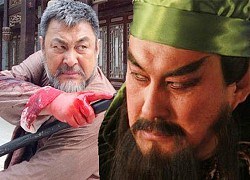 team youtube20:00:14 23/03/2021Famous for his role as Quan Van Truong in the movie Three Kingdoms Acting in 1994, few people know that Luc Thu Minh used to be in prison and was admitted to prison. supposed to have a grudge against Chau Tinh Tri. Although there were many actors who took on the role of...
team youtube20:00:14 23/03/2021Famous for his role as Quan Van Truong in the movie Three Kingdoms Acting in 1994, few people know that Luc Thu Minh used to be in prison and was admitted to prison. supposed to have a grudge against Chau Tinh Tri. Although there were many actors who took on the role of...

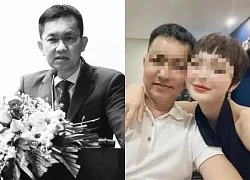





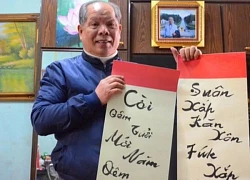







 Nga Sumo: Small but bottomless stomach, eating 15kg of cigarette butts, how is your health?
Nga Sumo: Small but bottomless stomach, eating 15kg of cigarette butts, how is your health?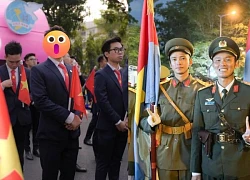 Chi Bao of the Entrepreneur Block 'shocked' Le Hoang Hiep, the profile reached the prestigious top?
Chi Bao of the Entrepreneur Block 'shocked' Le Hoang Hiep, the profile reached the prestigious top? Thien Thy Saint: Rumored to be in love with "disciple" Do Mixi, showing off her with 17+ photos, just reappeared
Thien Thy Saint: Rumored to be in love with "disciple" Do Mixi, showing off her with 17+ photos, just reappeared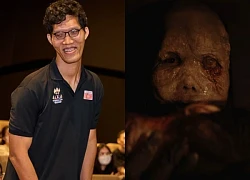 Tran Ngoc Tu 'ghost' Detective Tu Kien caused a screen fever, who is more than 2m tall and weighs 120kg?
Tran Ngoc Tu 'ghost' Detective Tu Kien caused a screen fever, who is more than 2m tall and weighs 120kg? Lawyer Ha was 'shouted' to consult the most famous law 'Top Top' reveals the past of selling fish that few people expect
Lawyer Ha was 'shouted' to consult the most famous law 'Top Top' reveals the past of selling fish that few people expect
2 | 0 Discuss | Report